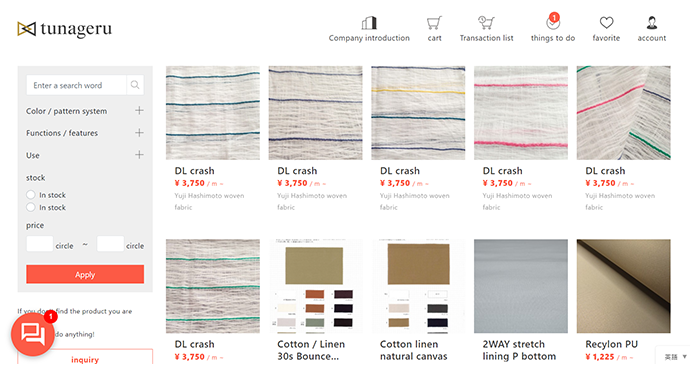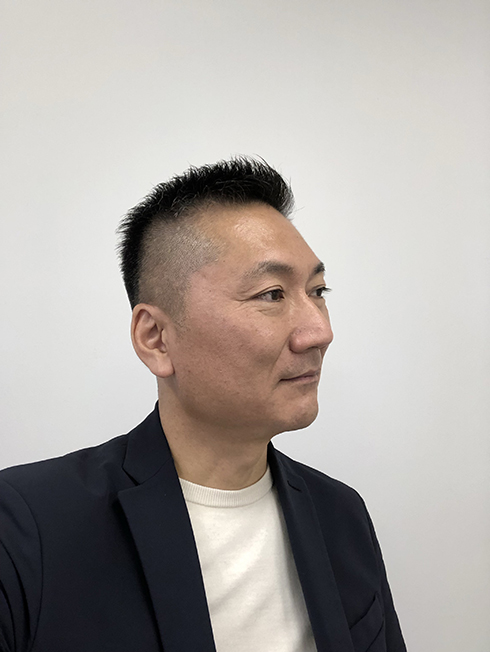
After successfully connecting buyers to the textile supply chain in Japan, the e-commerce startup D-Plus Trading is setting its sights on Southeast Asia. D-Plus Trading’s goal is to fill in the gap between buyers, sellers, and suppliers of fabric, first in its home country, Japan, and later in the rest of the world.
Using a special technology called tunageru, D-Plus makes it possible for buyers and sellers of textiles to be matched directly with several small factories across the country. With this innovation, the company aims to be a leading fabric platform. Moreover, with the help of the Japan External Trade Organization (JETRO), D-Plus will introduce its innovation to Southeast Asia’s textile industry, and by extension, to the vast regional market.
Established in 2016, D-Plus is an e-commerce platform that overcomes the physical boundaries between big and small businesses. As a Japanese startup, D-Plus untangles the difficult process of retrieving information from the fabrics supply chain to deliver it in a well-packaged and informative platform that connects businesses with each other. With D-Plus’ technology, businesses can freely access potential partners’ profiles and products—from factory information to product information.
Tunageru technology and the textile industry
D-Plus’s technology is a welcome development considering recent events. The links that connect buyers and businesses have nearly been severed by the onset of the ongoing COVID-19 pandemic. As movement restrictions and state-sanctioned lockdowns were enforced, digital platforms responded to this need by providing avenues where companies can find their potential clients online. It is here that D-Plus introduces tunageru.
Tunageru operates under a business-to-business logic, which allows textile businesses to link up with factories that produce fabrics and textile accessories. Once users are registered on tunageru, the process is easy to follow. Businesses looking for a supplier can use the platform’s search functions, including its keyword search. This makes the search process for a prospective partner generally hassle-free, with all the information businesses will need right at their fingertips.
Once they’ve settled on a fabric supplier they like, users can then select a fabric from the supplier’s sample book and then request a quotation. After this, it should be as simple as checking out any item and waiting for orders to be shipped to them. Tunageru’s payment system involves fintech innovations that improve ease of access to all users.
On expanding to the Southeast Asian market

D-Plus Trading CEO, Toru Domae
D-Plus CEO Toru Domae tells e27 in an interview that as a digital platform, D-Plus has the advantage of adaptability. In this light, the company looks forward to expanding its investment in systems. With such a mediator within the industry, textiles are bound to discover new synergies with new upstarts, while maintaining a steady growth for more established companies.
At present, most of D-Plus’s clients are domestic businesses and factories overseas, particularly in China. However, with its expansion into the Southeast Asian market, it opens up opportunities for more transnational synergy within the global textile industry.
Since big names in the fashion industry have outsourced their services to Southeast Asian countries like Vietnam and Cambodia, textiles have been booming in the region. Vietnam and Cambodia in particular are names often mentioned alongside China, the world’s leading exporter of textile apparel. However, the region is more than just production sites for outsourced labour.
Also read: Can agritech solve the world’s growing food security problem?
Southeast Asia is starting to respond to issues of sustainable fashion by producing local innovations themselves. According to Domae, Southeast Asia has become crucial in expanding sales as a production base for most global manufacturers, while at the same time producing plenty of potential buyers in the industry as well.
Businesses and individuals interested in apparel, general merchandise, and interior goods are part of D-Plus’ target market, and with the company’s current outlook on Southeast Asia, these are also part of the region’s demographic. Reports on the regional market’s interest in the fashion and textile industry show that consumption of these products is set for an upward trend until 2025, which is an optimistic projection for a business like D-Plus.
Ways forward and general outlook
In 2021, D-Plus further explored its plans for expansion by participating in the Singapore Week of Innovation and Technology (SWITCH) events, as well as SLINGSHOT, a startup network also based in Singapore. With the support of JETRO, D-Plus was able to introduce itself to its prospective market alongside other upcoming players in diverse fields working with tech.
When asked about its ways forward, Domae explains to e27 that apart from JETRO, D-Plus has already received investment from Japan-based venture capitalists. Other than this, the company will also continue to raise funds for its planned extension into Southeast Asia.
Also read: AMATELUS is ready to launch multi-angle video streaming technology in Southeast Asia
The development of a tech-powered solution for businesses in an industry as central to Southeast Asia’s economy as textile is certainly something to look forward to. Still, the innovation D-Plus brought to Japan will have to make a few adjustments once it moves to an entire region, but Domae assures us with a strong optimism that D-Plus will continue to aim for the title of the world’s leading fabric platformer using tunageru.
– –
This article is produced by the e27 team, sponsored by
We can share your story at e27, too. Engage the Southeast Asian tech ecosystem by bringing your story to the world. Visit us at e27.co/advertise to get started.
The post Putting the Tech in Textile: D-Plus Trading reinvents the textile scene appeared first on e27.

